
As one of the oldest Euro-Atlantic member states in the region of Southeast Europe, Greece enjoys a prominent geopolitical role as a middle power, due to its political and geographical proximity to Europe, Asia, the Middle East and Africa. Its main allies are the United States, the United Kingdom, France, Italy, Cyprus and the rest of the European Union, NATO, and UN.
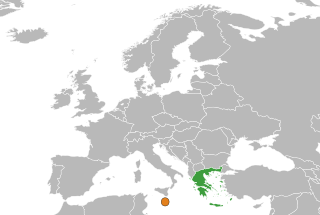
Since 2004, Greece has an embassy in Valletta and accredited its first ambassador to Malta. Before that date the Greek embassy in Rome was accredited for Malta. Malta has an embassy in Athens and two honorary consulates in Piraeus and Thessaloniki. The two countries share membership of the European Union and of the Union for the Mediterranean.

Greece and Ukraine have deep ties due to Orthodox Christianity and enjoy strong diplomatic relations, due to Greece’s active diplomatic support for Ukraine over the Annexation of Crimea by the Russian Federation. Greece is also one of the main supporters of Ukraine’s entry into the European Union and NATO. Greece recognized Ukraine on December 31, 1991. Both countries established diplomatic relations in 1992. Greece opened an embassy in Kyiv in 1993, general-consulates were set up in Mariupol and Odesa. Ukraine has opened an embassy in Athens and since April 2004 a general-consulate in Thessaloniki. Both countries are full members of the Organization for Security and Co-operation in Europe and of the Organization of the Black Sea Economic Cooperation. There is a large Greek community living in Ukraine. Ukraine was first settled by the Greeks as early as 500 B.C. The Ukrainian city of Odesa was founded by ancient Greek colonists, being also the place where the Filiki Eteria secret organization was founded. Greece is a member of the European Union, which Ukraine applied for in 2022.
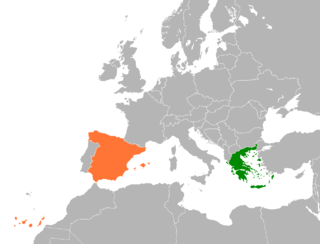
Both Greece and Spain are members of the European Union, NATO, the Organization for Security and Co-operation in Europe, the OECD, the Union for the Mediterranean, and the United Nations.

Foreign relations exist between Australia and Greece. Relations between the two states are close: the countries were allies during both World Wars and the Korean War. During World War II, Australian forces took part in the Battle of Greece and the Battle of Crete. There is a large Greek community in Australia. Each country has an embassy in the other's capital. Greece also has consulates general in Sydney, Melbourne and Adelaide, as well as a consulate in Perth, honorary consulates general in Brisbane and Darwin, and honorary consulates in Newcastle and Hobart. Both countries are full members of the Organisation for Economic Co-operation and Development.

Greece–New Zealand relations are foreign relations between Greece and New Zealand. Greece is accredited to New Zealand from its embassy in Canberra, Australia. New Zealand has a non-resident ambassador in Rome, Italy.

People's Republic of China has an embassy in Athens. The Hellenic Republic has an embassy in Beijing and three general consulates in Guangzhou, Hong-Kong and since 2005 in Shanghai. The Port of Piraeus is important from a geostrategic view for China, as it helps China's transactions with the whole of Europe. Thousands of Chinese people are living in Greece in the Overseas Chinese context and approximately 1000 Greek citizens are living in China. Modern diplomatic relations between the two countries were established in 1972. Today, Greece and China enjoy a very good relationship based on a solid foundation, which continues to be growing steadily.

Greece–India relations, also known as Indo–Greek relations, are the international relations between the Republic of India and the Hellenic Republic. Greece has an embassy in New Delhi and three honorary consulates in Kolkata, Chennai and Mumbai. India has an embassy in Athens and an honorary consulate in Thessaloniki. As of 2023, the relation between the two countries is closer than ever and is considered historical and strategic by both parts.

Croatia and Greece established diplomatic relations on July 20, 1992. Since November 1994, Greece has an embassy in Zagreb. Croatia has an embassy in Athens. The relations between Croatia and Greece have been regarded as excellent with a high cooperation between the two countries on the economic, touristic and political aspect. Greece was a key supporter during the accession process of Croatia to the European Union. Both countries are full members of the European Union, NATO and of the Council of Europe.

Greece has an embassy in Berlin and five General Consulates in Hamburg, Munich, Düsseldorf, Stuttgart and Frankfurt. Germany has an embassy in Athens and a General Consulate in Thessaloniki. Germany and Greece are full members of the Organization for Security and Co-operation in Europe, of the Organisation for Economic Co-operation and Development, of NATO, of the European Union, and of the Eurozone.
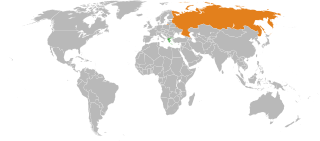
Greco-Russian relations are the bilateral foreign relations between Greece and Russia. The two countries first entered into diplomatic relations in 1828. Both Greece and Russia are members of international organizations and agreements, including the United Nations, Organization for Security and Cooperation in Europe, and the Organization of the Black Sea Economic Cooperation.

Greece and Hungary established diplomatic relations on July 7, 1956. Both countries exchanged embassies in the other one's capital on August 24, 1964. Both countries are full members of the European Union, NATO, OECD, OSCE and the Council of Europe. There are around 2,500 people of Greek descent living in Hungary. Meanwhile, there are around 2,000 people of Hungarian descent living in Greece, according to an assessment of 2011.

The first contact between Greece and Sweden can be traced back to the 11th century. Both countries established diplomatic relations in 1852. Both countries are members of the Council of Europe, of the Organisation for Economic Co-operation and Development, of the Organization for Security and Co-operation in Europe, and of the European Union. Greece is a full member of NATO. Sweden is not a full member.

The Hellenic Republic recognised the Republic of Estonia on May 19, 1922. Greece never recognised the Soviet annexation of Estonia. Both countries re-established diplomatic relations on October 2, 1991. In April 1997, Estonia has established an embassy in Athens. The Greek embassy in Tallinn opened in January 2005. Estonia has also 3 honorary consulates in Patras, Piraeus and Thessaloniki. Both countries are full members of the European Union and NATO.
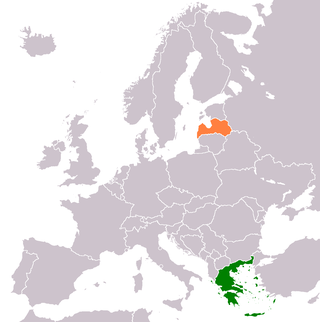
Greek-Latvian relations are the bilateral relations between Greece and Latvia. Both countries are full members of the Organization for Security and Co-operation in Europe, of NATO and the European Union. The Latvian embassy in Athens was established in 1998. Latvia also has two honorary consulates in Piraeus and in Thessaloniki. The Greek embassy in Riga was opened in January 2005.

Greece and Lithuania are both full members of the Organization for Security and Co-operation in Europe, of the Council of Europe, of the European Union and of NATO.
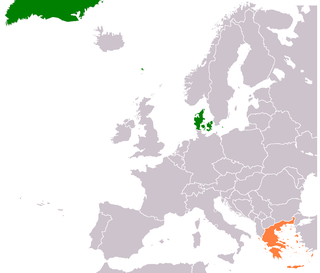
Denmark has an embassy in Athens and an honorary consulate in Thessaloniki. Greece has an embassy in Copenhagen and two honorary consulates in Arhus and Tórshavn. Both countries are full members of the Organization for Security and Co-operation in Europe, of the Organisation for Economic Co-operation and Development, of NATO and of the European Union.

Greek–Icelandic relations are foreign, economic and cultural relations between Greece and Iceland. Greece is represented in Iceland through its embassy in Oslo (Norway) and through an honorary consulate in Reykjavík. Iceland is represented in Greece through its embassy in Oslo (Norway) and through an honorary consulate in Athens. They have been firm allies for over 60 years, and have reaffirmed their ties recently at the highest levels of contacts.

France–Greece relations, or Franco-Greek relations, are foreign relations between France and Greece. In modern history, both countries established diplomatic relations in 1833, three years after Greek Independence. France and Greece, due to strong cultural and historical ties, have had a traditionally strong and special relationship and strategic alliance for decades and today enjoy strong diplomatic relations also.

Greece–Portugal relations refer to bilateral relations between Greece and Portugal. The diplomatic relations between the two countries date back to 1835, following the independence of Greece. The Greek government sought to establish diplomatic relations with Portugal, and nominated the Count Andreas Metaxas as the first Greek Ambassador non-resident in Lisbon. On 29 May 1924, Portugal recognized, de jure and de facto, the Second Hellenic Republic,. It has kept diplomatic relations with Greece until the present day. Portugal and Greece maintain a strong diplomatic relationship, strengthened by the fact that both countries are present in multiple international organizations, such as the Council of Europe, European Union, NATO and the United Nations.
























